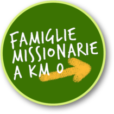THE CHARACTERISTICS OF THE EXPERIENCE IN THE DIOCESE OF MILAN
The group: Since 2014 the Diocese of Milan has accepted the challenge of giving “accompaniment” to a group of families from various associations or movements (Secular Franciscan Order, the Mato Grosso Operation, Scouts, the Pope John XXIII Association, Communion and Liberation, the Lay Missionaries of Our Lady of Consolation, fidei donum missionary families) and support them in their journey. They have all had a meaningfully lived ecclesial experience and are filled with gratitude for what the Church has given them in their experience, with a desire to “repay” what they have received. We could say that it is the couple has a “vocation” within their vocation to marriage.
Being church: It is truly wonderful to share this experience with couples who belong to various ecclesial groups, an incredible wealth, which gives us a perception of “being Church” The former Bishop of Milan, Cardinal Angelo Scola, spoke of “pluriformity in unity.” They are families who chose to live in different parishes throughout the Diocese of Milan to have an experience that might last several years of hospitality, sharing pastoral responsibility with the clergy, of fraternity. To help give a familiar and diverse shape to the parish and the Church. A Church in which vocations – vocations to marriage, to the ordained ministry and religious vocations – nourish and strengthen one another, where together they place themselves at the service of the proclamation of the Gospel.
The family “remains a family” with its own times, rhythm, place. The spouses keep their jobs, not only as a source of income and personal fulfillment, but also as an opportunity to bear witness and proclaim the Good News. They do not rely on the parish for finances. The children live life in the neighborhood, often attending neighborhood schools. It is in this context that we have the most important contacts with those who are removed from parish life. The experience in the parish is for a certain amount of time, with the willingness to continue to live in the parish even when the parish priest is changed.
A style of openness. The family’s first task is to be present “on the ground” in a style of acceptance and openness to those who knock, especially those who are “distant”. Then, based on the needs of the community, they eventually take on some of the tasks of pastoral leadership, not to substitute the laity already in the parish, but to support an increasingly significant lay presence.
The priest will find in the family an opportunity to find a family climate: they share some meals each week, times of listening to the Word or prayer, little acts of attention, good neighborliness, fraternal exchange and pastoral cooperation.
Each reality per sé has the same spirit, but not an identical model. It is different if the priest and the families live “on the same floor” or if, in the case of a pastoral teams, the priests and families live in different parish houses.
Time is slowly yielding some successes:
living in the neighborhood, the family has opportunities to proclaim the Gospel and have various perspectives of the territory where the priest doesn’t go: the schools, the sports arenas, playgrounds; and the parish community has an experience of the wealth of this new pastoral technique which helps present an image of a Church that is increasingly ministerial;
it helps promote the role and participation of the laity and families in parish life; it invites the people to make the parish a place of relationship rather than one of performing services;
the presence of the family helps the priest to imagine a family-friendly parish that takes into consideration real rhythms and the demands it makes.
Especially in the more marginalized urban contexts, they can share pastoral activities and the difficulties in meeting an indifferent, suffering, at times degraded, humanity; the resident family allows them to have a living presence and makes the Church present even in parishes without priests.
Taking the challenge. Without wanting to digress into dreams far from reality, we are convinced that we are in a pastoral “laboratory” that allows our Christian communities to live more the challenge we face in today’s reality in a more serene fashion. (That challenge is) how to manage to remain Christians among the people? How can we continue to incorporate Christian life and faith into daily life?
The social changes that have been occurring even faster in recent years, cultural and religious pluralism, the new frontiers open to science and technology – all of these necessitate the Christian communities’ questioning themselves about the ways they are present in society, in order to remain faithful to their commitment to be Church in the places where people love.
This experience is helping the Diocese of Milan see how it can be a special place for asking these and other questions. And when an experience raises more questions than answers, it is a sign of the presence of the Holy Spirit.
We want to emphasize strongly that this form of ecclesial life not only requires preparation for the laity who choose it, but also priests and bishops who are “new” in their style and mentality.





